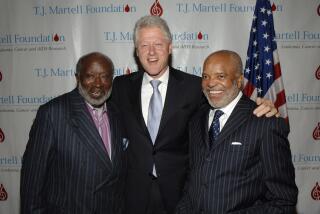BOOK REVIEW : Lobbyist Away From Limelight : LION IN THE LOBBY Clarence Mitchell Jr.’s Struggle for the Passage of Civil Rights Laws<i> by Denton L. Watson</i> William Morrow & Co. $24.95, 846 pages
- Share via
At 846 pages, “Lion in the Lobby” is a monumental, meticulously detailed history of not only the NAACP’s 73-year legislative battle for creating and enforcing civil rights laws but also of Clarence Mitchell Jr., its director in Washington from 1950 to 1978.
Described by Sen. Howard Baker Jr. as “the 101st Senator,” and by others as a “walking civil rights archive,” Mitchell--who carried a copy of the U.S. Constitution in his wallet--has often been overshadowed by more celebrated activists, such as his colleagues Adam Clayton Powell and Roy Wilkins.
Fortunately for us, Denton L. Watson, director of public relations for the NAACP, presents a decade of painstaking research that demonstrates why Mitchell was “the most effective civil rights lobbyist in Washington.”
By tracing Mitchell’s life from his early days as a reporter for the Baltimore Afro-American in 1933 (he covered the epic Scottsboro trial) through his work for the St. Paul Urban League and Fair Employment Practice Committee during the Depression, and at last to his NAACP post, Watson provides us with a stirring example of how political change is achieved--not only by news-making protest demonstrations (although Mitchell engaged in these) but also by the quiet, dedicated labor of lobbying, applying pressure, and monitoring the three branches of government.
Working quietly, away from the limelight occupied by others, his every step watched carefully by J. Edgar Hoover, he developed strategies and lined up supporters--congressmen such as Hubert Humphrey, even a young Richard Nixon--to implement the passage of significant civil rights legislation.
“My life’s work,” Mitchell wrote in the foreword of a book he did not live to finish, “(was) to make the Constitution a meaningful document for all people. . . . We need not only just laws but also right national policies.” Unable to complete his study, he entrusted the responsibility to Watson.
To a degree, we know the background of the national drama (or trauma) that led to Mitchell’s (and our) greatest legal triumphs: the passage of the Civil Rights Act of 1964, Voting Rights Act of 1965, and Fair Housing Act of 1968. But Watson’s research--drawn from countless interviews with Mitchell, from his files and eight libraries and archives--breathes freshness into history too easily forgotten.
Mitchell had, it should be noted, an unwavering faith in the democratic process. The black separatist philosophy that arose in the 1960s was, says Watson, “sacrilege to veteran (‘moderate’) leaders like Wilkins, Mitchell, and Whitney Young.” Thus, Mitchell “sought no new rights for blacks, only that they should be extended the same rights accorded to others under the Constitution.
The moral and political justifications for the safeguards he sought were given political weight by the fact that his proposals to Congress and the executive branch were based on actual circumstances, rather than on social and political ideology or on philosophical concepts.”
Mitchell’s expertise, his “genius for influencing lawmakers of all shades of ideology,” served him well through the differing civil rights positions of seven Presidents:
Harry Truman, he felt, “was a giant on civil rights--a vast improvement over Roosevelt, who had not only been slippery but had always protected his flanks”; Dwight Eisenhower “was more valuable than he knew or intended”; John Kennedy “believed it was only necessary to speak out on civil rights when it would help him.”
While Lyndon Johnson’s Great Society programs won Mitchell’s approval, Nixon came to view as a President who “presented the NAACP with an unaccustomed slick stage on which to perform.” Gerald Ford was “a relief, but not much,” and, in Jimmy Carter, as we might expect, the lobbyist saw “a 180-degree change in the racial attitudes of Presidents,” for the better.
Oddly enough, Martin Luther King Jr., whom Mitchell regarded “as close to being a saint,” nevertheless brought the NAACP problems through his opposition to the Vietnam War (Mitchell “felt blacks wanted to be in there right along with everyone else”) and his “elevation of moral law over the Constitution,” which in the battle for constitutional rights caused “contradictions that were not necessarily helpful to African Americans.”
After so many decades of service, the presentation of the NAACP’s Spingarn Medal to Mitchell in 1969 and the Freedom Medal from President Carter in 1980 seem fitting.
Yet, Watson reports that “Mitchell died poor but relatively oblivious of his condition. He had subsisted during his entire NAACP career on a salary that Wilkins kept low by his own self-denial in order to keep the association solvent.” His wife Juanita adds: “We are poor because he gave so much, and I gave so much.”
Next: Jonathan Kirsch reviews “Unstrung Heroes: My Improbable Life with Four Impossible Uncles” by Franz Lidz (Random House).


